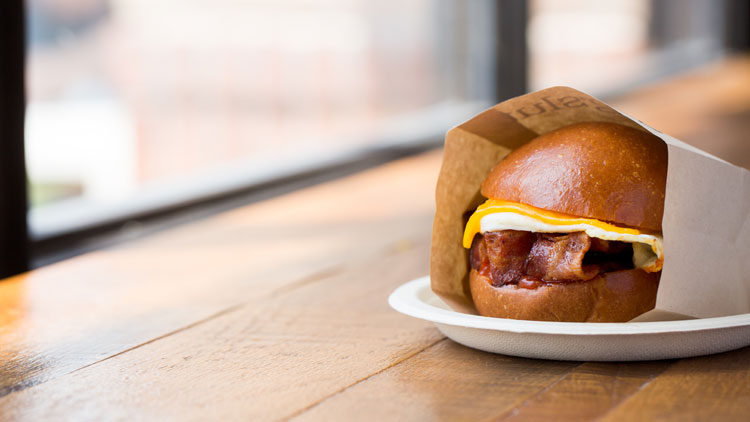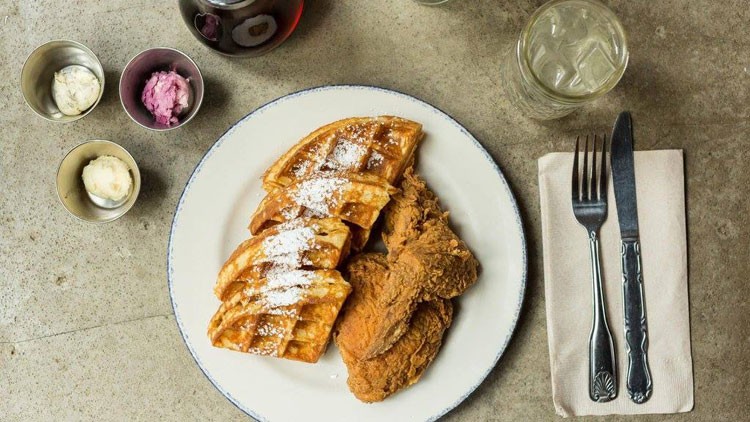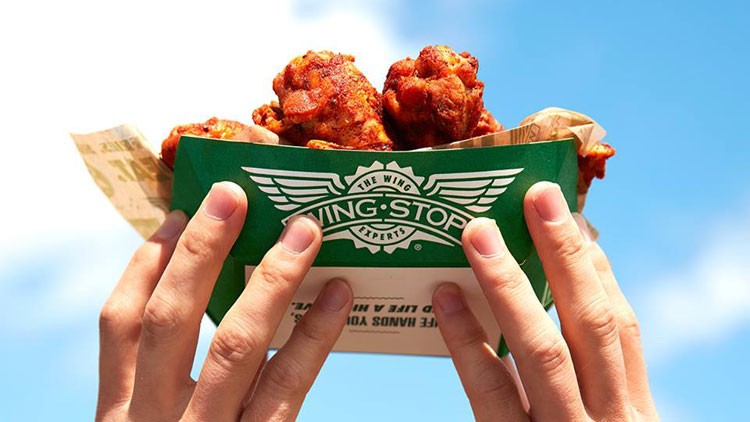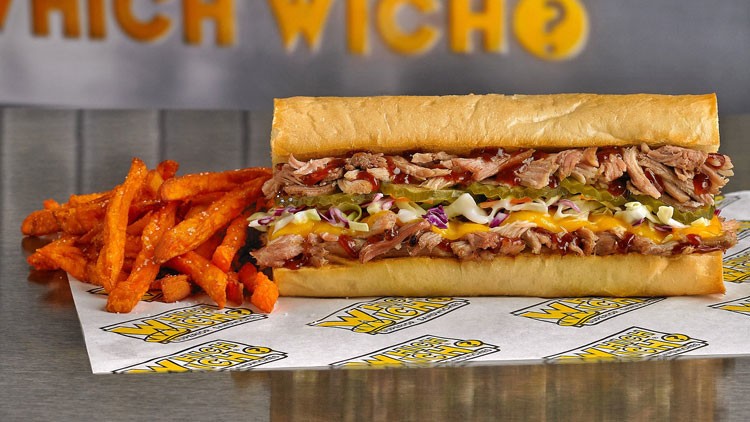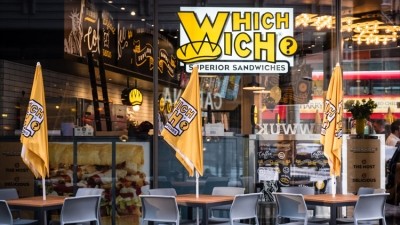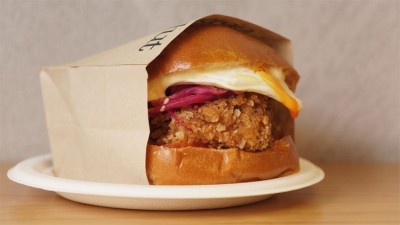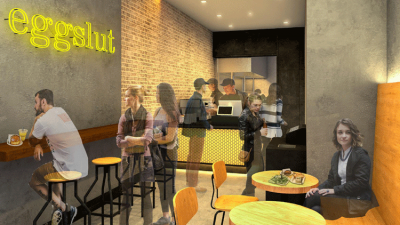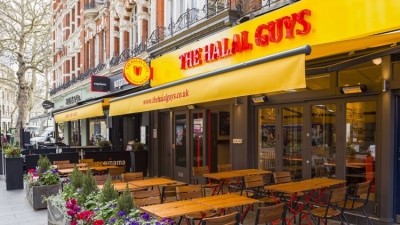American dreamers: why the US brands keep coming
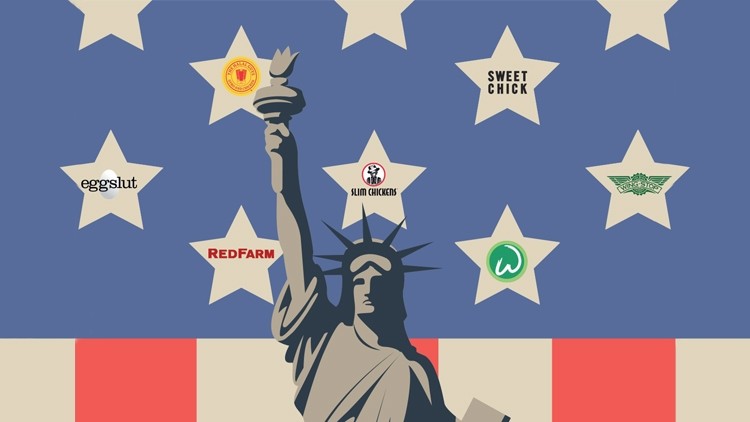
By Chloe. Egg Slut. Wahlburgers. Halal Guys. Slim Chickens. Wing Stop. Sweet Chick. RedFarm. The list of US restaurant brands that have pitched up on London soil in the past year or so is as long as it is varied, with everything from movie star-fronted burger chains and rapper-backed fried chicken and waffle brands to vegan food and Pac Man-inspired dumplings crossing the pond.
US restaurant brands are not uncommon sights on the capital’s streets; from McDonald’s and Burger King through to more recent burger players Shake Shack and Five Guys, American restaurants have long been a prominent part of the dining landscape, and this recent incursion indicates that the UK, and in particular London, remains fertile ground for brands from across the Atlantic. Yet, given that the capital is home to one of the world’s most competitive and crowded restaurant sectors as well as high rents, rates and premiums in high-footfall locations, why does it still hold such appeal?
Gateway to Europe
For US brands looking for significant expansion, London remains the gateway to Europe, making it the logical first port of call for US brands, says Ted Schama, partner at property agent Shelley Sandzer. “If you look at Five Guys, it came to London first, went on a rampant expansion and has now successfully conquered Europe. On a macro level [London] is where you would start.”
Five Guys UK CEO John Eckbert supports Schama’s view. “These are two countries divided by a common language,” he says. “From an American perspective, the UK feels culturally adjacent to the US. If you think of where in the world you’re going to make a first step outside the US, the UK is the obvious, easiest place to go first. Is it always the best? Maybe not. But you can gain some confidence in the UK.
“China is a much bigger market, if you can win there it will have more of an impact, but the UK is a friendly, soft landing for US brands aspiring to become global in their appeal. There’s been a lot of brands that have blazed that trail, so it feels easier to follow the model of someone successful than trying to form your own.”
London was the obvious place to kick-start Egg Slut’s European expansion, says Whitney White Myrus, managing partner at ITICO F+B, the company behind the US brand’s UK rollout. The LA-based restaurant group opened its eighth location, its first in Europe, in London’s Notting Hill earlier this year, a decision partly influenced by its Instagram following over here.
“Egg Slut is a brand of Instagram, it grew up with it,” according to Myrus, who says the company ran a report of its 160,000 Instagram followers and found that 10,000 were based in the UK and 4,000 of those lived in London. “There was a built-in customer.”
There were other reasons why London was an obvious choice for Myrus, who is also behind the recent arrival of US dining chain The Halal Guys in the capital. “London is an iconic city. The connection between [London and] US cities such as New York and LA has always been very strong; it’s not about just bringing a brand here, it’s about having a matching culture. We are not bringing something from the centre of the States that doesn’t have that direct connection to London.”
Rather than expand across the US first, as has often been the case in the past, this new breed of US brands is prioritising expansion on a global rather than domestic scale. Egg Slut’s US locations are all on the West Coast (LA and Las Vegas), with the brand choosing to expand to Japan, Kuwait and the UK rather than across the States.
The perceived similarities between London, New York and LA is also the driving force behind Sweet Chick’s move to the UK capital for its international debut. The fried chicken and waffle brand, which was launched by John Seymour in New York in 2013 and now counts rapper Nas as an investor, opened last month in Fitzrovia’s Market Place. Moving to London, according to Seymour, made more sense than opening in other parts of his homeland.
“Our LA location is 3,000 miles away from our home base and has gone really well. Why have we chosen London over Chicago, Miami, Atlanta or Texas? Because London is important. We could continue to grow in the States but with the same issues – opening a sixth location in the States would be just as hard.”
While he admits that operationally it might be easier to open more restaurants in the US, the current weak pound helped sway the decision to take the plunge into the UK. “The dollar is strong, which is a huge help,” he admits. “It helped the timeline. If the pound was a lot stronger, this might not have made sense financially.”
Keeping things fresh
Egg Slut’s core offer includes the Fairfax, a brioche bun filled with scrambled egg, and its signature Slut – a coddled egg on top of potato puree, poached in a glass jar and served with baguette slices. Sweet Chick, meanwhile, majors on fried chicken and waffles in various styles, including Nashville fried chicken served with a milk jam waffle; and buffalo fried chicken with a celery and carrot waffle. Both offer something relatively new to London’s dining scene, which Schama says is now more important than ever.
“London might be crowded, but there are still plenty of US brands out there that are interesting. Sweet Chick is fresh to the London scene and is offering something sexy from the States, and something sexy from the Sates is very translatable. It’s got to be American at its heart – that’s a good starting point.”
Seymour doesn’t exactly share this view. “I don’t believe we’re saying ‘we’re from America come try us’,” is his position. That said, he doesn’t want to lose the brand’s core American identity, including staying true to Sweet Chick’s menu, even if it means serving dishes and combinations with which some Londoners might not be familiar, not least shrimp and grits, fried catfish, and chicken with a buttermilk biscuit and mashed potato.
“The core of the menu will stick to who we are. Shrimp and grits is a weird thing here, right? For now it’s fun, but if no one shows up to eat it won’t be fun. It’s interesting for us to be learning about what people like.”
Egg Slut has taken a similar tack; its Notting Hill menu is identical to the US, with the exception that it serves a flat white. It uses British produce, including Clarence Court Burford Brown eggs and brioche buns from Bread Ahead, and has tried to match every single flavour profile that it has in the States, according to Myrus, who says the company started with six different egg providers each providing four different variations to taste and went through 100 variations of buns as well as multiple versions of its turkey sausage. Bacon was probably the biggest challenge, with 40 different versions tested. “Traditional bacon in the UK is too meaty and thick,” he says.
Sticking to what made a restaurant successful in the first place makes sense, but those US brands that have flourished over here have also been able to, where necessary, mould to their locations, says Schama. “A New York restaurant might tap into a Jewish or Chinese culture that might not exist in the same way elsewhere. If the underlying offer is the cult or vibe of a restaurant, that is the hardest element to export as that might not be accessible to Londoners.”
This is an issue over which Seymour has wrangled with Sweet Chick’s dish The General - fried chicken with General Tso’s sauce. “It’s a take on New York Chinese food that’s kind of like Szechuan sauce, the nostalgia of it is such a New York thing. But my guys in London don’t know what General Tso’s is. Do we stick to our regimented menu, or do we conform to the London palate?
As a result, the dish has been changed to kung pao chicken for London.
Go big or go home?
Egg Slut and Sweet Chick have different ambitions. Seymour says there are no immediate plans for multiple Sweet Chicks in the UK, with the focus instead on having a flagship London site. “As of right now I’m thinking let’s slow down,” he says. “I want to create real memories in this space, and do it right.”
One reason for his reticence to expand further is Sweet Chick’s casual dining model, which is at odds with the majority of US brands over here that predominantly occupy the fast food space. “Fast causal is scalable but with that you lack the connection to your customers. We have an opportunity to have a customer leaving feeling better than they did when they came in. With fast casual that’s a lot harder.”
Egg Slut, by comparison, is already actively looking for a second site and Myrus says the intention is to open around 10 restaurants in the UK in the coming years. It isn’t sticking to the capital either, but following the Five Guys model of looking further afield early on, with locations under consideration including Shoreditch, Canary Wharf and Soho in London and also Edinburgh, Brighton, Bristol, Cardiff, Oxford, Manchester and Liverpool. “We want 10 locations, but if it takes us five years that’s how long it takes,” he says. “It’s all about the real estate and ensuring we get the right locations.”
The company takes site selection seriously, and says Notting Hill came up after two years of searching, during which time more than 500 locations in London alone were considered. When a suitable site comes up the partners make numerous personal visits to the area (Myrus believes its choice of Notting Hill has been justified by a Five Guys opening up opposite the week before).
Other recent US imports also regard London as being able to sustain more than one location. Vegan food brand By Chloe, which entered the UK at the start of last year, already has four locations in London, and Wingstop, the global wing concept operated in the UK by Lemon Pepper Holdings under a master franchise agreement, has just opened a second restaurant in Dalston with more to follow. The brand, which has more than 1,200 locations worldwide, said it planned to grow to 100 sites over the next 12 years at the time of the announcement of its debut UK site.
Boparan Restaurant Group has opened a fifth Slim Chickens in the UK and says it has “ambitious growth plans” for the US brand to key cities across the UK by 2022. New York-based Halal Guys plans to expand to around 20 locations across the country over the next five years having signed a franchise deal with Myrus’ ITICO F+B, and Wahlburgers, the burger chain fronted by actor Mark Wahlberg, plans to open 15 restaurants in five years across London and the UK following its opening in London’s Covent Garden this May.
Longevity in London
But can London sustain the continued glut of US brands? For every Five Guys or Shake Shack success story there is a more cautionary tale – Chicago-based sandwich brand Potbelly’s play into the UK was short-lived and US-born burger restaurant BurgerFi closed its two UK sites after only a few years of trading. Burrito brand Chipotle is perhaps the best example in recent years of a restaurant brand with a huge US presence that hasn’t had similar success over here. At the start of this year it opened its first UK restaurant in three and half years and has just seven UK sites despite operating around 2,500 restaurants across the world.
Other US brands have chosen not to debut in London, but this hasn’t necessarily led to faster growth. Seattle-based MOD Pizza, which is backed by Charles Dunstone, who also brought Five Guys to the UK, chose Leeds for its UK debut, while Smashburger opted for Milton Keynes. Yet both brands’ growth thus far on these shores has been slower than first indicated.
So why have some US restaurant brands struggled, or at least failed to live up to early expectations? “There is a risk of treating the UK as the 51st state in terms of expansion, without taking the time or effort to understand the market,” says Five Guys’ Eckbert.
“Every aspect of the business – employment, supply chain, construction – has meaningful differences, some very surprising. If you think it will be the same or it’s going to be easy you’ll be surprised. It’s better to have your eyes open and walk with a sense of discovery and humility, then you’ll have a much better shot at success.”
“The problem with a lot of American brands is that they look to enter the London market without stopping to consider the truth it is one of the toughest to expand within due to the enormously high operating costs,” says Rami Awada, managing director at AAA Investment House and master franchisee of Dallas-based sandwich company Which Wich. “They assume they can effectively plug and play a brand they’ve taken from the US high street, and try to compensate on the high operating costs by compromising on the ingredients.”
Which Wich has close to 500 sites across 12 countries and opened its first restaurant in London last year. It is keeping its expansion plans conservative, with two more restaurants due to open in the coming six months after a year of “trial and error”, says Awada. “Rather than over-expand and open a load of sites in a short time, which is a mistake a lot of similar brands have tried to do, our approach has been to establish a single site; gauge the response and tweak the concept and menu before looking to expand.”
“While the brand has a big following in the US, there are differences in expectation, tastes and price in the London market,” adds Kevin Todd, non-executive chairman and shareholder in Which Wich. “The team has taken the time to recognise what connects with the London customer, and understand the economical differences. Getting those things correct before you roll out is very important. Not doing this is the reason why we have seen so many other international brands struggle when entering the UK market.”
Myrus insists Egg Slut is “not a brand that is going to be on every street corner”, and wants to maintain its exclusivity by opening up with caution. “If it takes us five years to get to 10 locations, it does. It’s all about building a brand consciousness that resonates.”
US brands would do well to be cautious, counsels Schama, who warns against incoming brands believing their own hype. “People can get carried away on a wave of self confidence – it’s what sits beneath that’s important.
“We often get enquiries from middle-of-the-road brands through a franchise model that don’t have the knowledge or the depth of contacts to get past first base. Those brands that immersed themselves prior to and during launch have been the most successful.”
As to which US brands might still come over, Schama and Myrus are keeping tight-lipped. In-N-Out burger has famously embarked on a number of hugely popular one-day pop-ups in Europe, but there is little to suggest it has plans for anything more permanent here, says Schama. US fast food restaurant chain Chick-fil-A has opened its first UK franchise, in Reading, believed to be part of a major play for the UK (although the debut restaurant will close after six months following protests by LGBT+ groups). US burger chain Wendy’s also looks to be gearing up for a permanent return to the UK a decade after it left.
And what of casual dining chain Cheesecake Factory, another whose introduction into the UK has long been mooted? “It is a very complicated requirement [for Cheesecake Factory],” says Schama. “The US property template is wildly different to the UK. A lot of its sites are built by shopping malls and land is so much easier to come by in the US. It’s a brand that could be very successful [over here], but does it morph itself for the UK? If so, it could be entering a quagmire, which is partly why it is taking so long. But it is so well known and respected in the US and that’s a really good starting point.”
As to what might yet come over, Schama believes southern American and Tex-Mex food is still “wildly unexplored” in the UK, and that the more established categories, like burger and fried chicken, could still see new entrants. “I wouldn’t underestimate Uncle Sam. The US has still got a lot more to give.”
This is a web version of an article that first appeared in the November issue of Restaurant magazine, the leading title for the UK's restaurant industry. For more features, comment, interviews and in-depth analysis of the restaurant sector subscribe to Restaurant magazine here.
